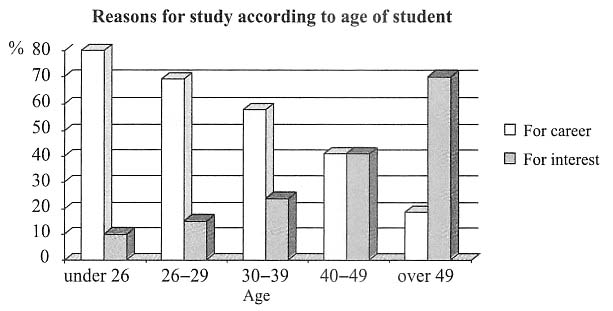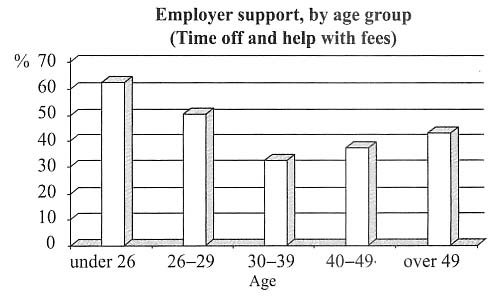Writing Module1. In some countries young people are encouraged to work or travel for year between finishing high school and starting university studies.
Discuss the advantages and disadvantages for young people who decide to do this.
[范文]
It is quite common these days for young people in many countries to have a break from studying after graduating from high school. The reasons for this trend may involve the recognition that a young adult who passes directly from school to university is rather restricted in terms of general knowledge and experience of the world. In my opinion, the advantages of such a trend outweigh its disadvantages.
By contrast, those who have spent some time earning a living or travelling to other places, have a broader view of life and better personal resources to draw upon. They tend to be more independent, which is a very important factor in academic study and research. Besides, this gives them an advantage in terms of coping with the challenges of student life.
However, there are certainly dangers in taking time off at that important age. Young adults may end up never returning to their studies or find it difficult to readapt to an academic environment. They may think that it is better to continue in a particular job, or to do something completely different from a university course. However, overall, I think this is less likely today, since academic qualifications are now essential for getting a reasonable career.
My view is that young people should be encouraged to broaden their horizons. That is the best way for them to get a clear perspective of what they are hoping to do with their lives and why. Students with such a perspective are usually the most effective and motivated ones and taking a year off may be the best way to gain this.
[解析] 1.语言表达
本文从正反两面论述观点,从论证手法上来说,较为客观和辩证。语言简洁明了,清晰地表达了作者的观点。
● In my opinion, the advantages of...outweigh its disadvantages...这个句型多用于在利弊分析题型话题的议论文中陈述自己的观点。
● By contrast, ...多用于引出讨论同一事物的对比内容或者对比观点。
● However, there are certainly dangers in...可用于在议论文中提出让步转折的观点。
2.逻辑结构
本文是典型的总分总结构的议论文。开篇先陈述事实并表达观点,第二段和第三段分别从正反面对观点进行论述,使得论证更加客观全面。最后一段作者重申自己的偏向。
2. It is generally believed that some people are born with certain talents, for instance for sport or music, and others are not. However, it is sometimes claimed that any child can be taught to become a good sports person or musician. Discuss both these views and give your own opinion.
[参考范文1]——孩子可以通过教学成才
Are children born with certain talents or can they be taught them? I believe children may be born with certain predispositions towards certain talents, but given enough time, patience and reasonable intelligence and basic ability, all children have the opportunity to be good at anything.
We can point to certain examples and claim a few children are born with talent, e.g. Mozart. These examples are usually flawed. Mozart is hailed as a child who was writing music when he was very young. Actually, there is now overwhelming evidence that he didn't write most of that music—his father did. He certainly wrote great pieces of music later in life, but by then it was teaching that had produced such talent.
In Outliers, Malcolm Gladwell states that it takes around 10,000 hours of practice to become "one of the best" at anything from playing ice hockey to playing the violin. Other factors can have an influence on whether a child is good at a particular sport. An obvious example is geography. If a child is born in Jamaica, the chances of him becoming a top ice hockey player are far lower than if he had been born in Sweden. China produces great table tennis players because table tennis is extremely popular there and the level of competition is correspondingly higher. It would be dubious to claim that Jamaicans cannot be taught ice hockey or that the Chinese are genetically better at table tennis.
Since there is little evidence that children are born with certain talents and given that even people with great talents point to training and hard work as the sources of their success, I believe that any child can be taught to be talented at something—so long as that child is prepared to put in time and effort.
[参考范文2]——孩子的才能是天生的
Are children born with talents or are all children capable of being taught them? I believe that children are born with talents and any teaching is only going to have a minimal effect on them.
Children are the products of their parents and are therefore a result of the genes of those parents. There are many cases of people who are good at mathematics having parents who are also good at that subject. The connection is clear. Sometimes, children do not seem to have the talents that their parents have, but I think this is because they do not take the opportunity to use their talent. Of course, it is a pity that such talent is then lost to humanity.
As I said, teaching could have a minimal effect on children. All children can learn something, but children without natural ability will be behind those who have it. If we look at schools where students are divided according to ability, we can see that the student roll in the highest class in any given year is almost identical to that in the roll in any other given year for that year group. In other words, few students move up or down.
This does not mean that we should forget about teaching. Instead we should focus teaching efforts on those students who already have a predisposition towards particular subjects.
In conclusion, children are essentially born with talents and those talents should be developed whilst we should not waste resources on those who have little or no talent in given areas.
3. The charts below show the main reasons for study among students of different age groups and the amount of support they received from employers.


[范文]
The information given by the bar charts is about the major causes of study among students in different age groups and the amount of support they received from employers.
The first graph shows that there is a gradual decrease in study for career reasons with age. Nearly 80% of students under 26 years old, study for their career. This percentage declines by 10%-20% every decade. Only 40% of 40-49 years olds and 18% of over 49 year olds are studying for career reasons. Conversely, there are only 10% of under 26 years olds Studying out of interest. The figure increases till the beginning of the fourth decade, and increases in late adulthood. However, 70% of over 49 years olds study for interest, about 4 times as many as that for career.
The second graph shows that employer support is maximum (about 60%) for the under 26 years old students. It drops rapidly to 32% up to the third decade of life, and then increases in late adulthood up to about 44%. It is unclear whether employer support is only for career-focused study, but the highest level is for those students who mainly study for career purposes.
All in all, it is clear to see that there is an obvious difference in the distribution of reasons for study according to age group and most employers would like to give younger staff members time off and fees to continue academic study.
[解析] 1.语言表达
本文用了很多描述客观事实的句型以及一些连接词,语言表达流畅通顺,如第二段中用到的this percentage,conversely,the figure,however。同时,注意表示上升和下降的词:decrease,decline,increase,drop。
● The information given by the bar charts is about the major causes of study among students in different age group and the amount of support they acquired from employers.
雅思小作文首段统一对原题进行paraphrase。本句用causes替换reasons,用acquire替换receive。句型运用的是:The information given by the...(+图表名称)is about…(+描述对象、地点、时间)。
● It is unclear whether employer support is only for career-focused study, but the highest level is for those students who mainly study for career purposes.
句型It is unclear whether...和It is clear to see that...常用于最后总结或对图表信息进行推断。
2.逻辑结构
本文是典型的总分总结构的小作文。开篇先paraphrase原题。第二、三部分开始描述两个表格的细节。最后一句话对全篇进行了高度概括,总结两个表格的最主要内容。
4. Some people think that universities should provide graduates with the knowledge and skills needed in the workplace. Others think that the true function of a university should be to give access to knowledge for its own sake, regardless of whether the course is useful to an employer.
What, in your opinion, should be the main function of a university?
[范文]
Education experts have spent years poring over surveys and compiling data, trying to come up with conclusive evidence as to the main function of a university. It seems in recent years the opinion swings from one extreme to the other. As far as I am concerned, giving access to knowledge is a more important function of a university.
One of the compelling arguments for universities providing graduates with expertise for their future careers finds its origins in economics. Parents have been investing in their children's college studies in the hope that they will earn a decent job with stable salary. Consequently, career preparation is becoming increasingly vital to the young people, especially in today's tight labor market with fewer jobs than before. Some people thus have called for universities to be more vocation-oriented because in that way not only the graduates' employment rates would be enhanced but the students will be motivated for being given an opportunity to succeed in their future professions.
However, reaching the conclusion that other functions, such as giving access to knowledge for its own sake, are no longer important is biased. For hundreds of years, especially in the west, the undergraduate education is, indeed, a liberal education, which means the undergraduates learn a wide range of curriculums such as psychology, economics, politics that have no direct relations to jobs. The upside of this is that it firstly enables students to become broad-minded and help them lay a solid theoretical foundation, and then they will be able to choose the most appropriate field based on their own interests for further studies. As long as students master how to gain knowledge, it is easy for them to know whatever they want to learn.
Personally, without suggesting that imparting career-oriented knowledge and skills is the sole function of modern universities, I think it is by no means a less important one. Giving access to knowledge is a more essential and fundamental function of a university.
[解析] 1.语言表达
本文语言简单、直接,用词准确,使用consequently, however等连接词使条理非常清晰;从反面让步,再转向正面论述,使得论证更加全面、客观。
●One of the compelling arguments for universities providing graduates with expertise for their future careers finds its origins in economics.
句型One of the compelling arguments for...finds its origins in...可用于议论文中摆出论据。
●Some people thus have called for universities to be more vocation-oriented because in that way not only the graduates' employment rates would be enhanced but the students will be motivated for being given an opportunity to succeed in their future professions. call for用于表达人们提出的要求;not only...but(also)…可用于表达某种做法带来的两种影响。
●The upside of this is that it firstly enables students to become broad-minded and help them lay a solid theoretical foundation, and then they will be able to choose the most appropriate field based on their own interests for further studies.
The upside of...用于表示事情好的一面;enable sb. to do sth. 表示某物或某事使人能够做某事,可用于表明其对人的影响。
2.逻辑结构
本文是总分总的结构。作者开篇先陈述事实并表达自己的观点,第二段从观点的反面让步,第三段正面表明观点,使论证更加客观全面。最后一段作者重申自己的立场。


